63.1.5.6 (63 > 52)
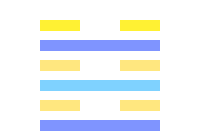
63.1.5.6 (63 > 52) - THE KÎ 3Î HEXAGRAM.
- 1. The first line, undivided, (shows its subject as a driver) who drags back his wheel, (or as a fox) which has wet his tail. There will be no error.
- 5. The fifth line, undivided, shows its subject (as) the neighbour in the east who slaughters an ox (for his sacrifice) ; but this is not equal to the (small) spring sacrifice of the neighbour in the west, whose sincerity receives the blessing.
- 6. The topmost line, divided, shows its subject with (even) his head immersed. The position is perilous.
63.1.5.6 (63 > 52) - Maximum
One clarifies one's stances after having studied the situation in depth.
Bing DeepL Google Yandex63.1.5.6 (63 > 52) - Maximum
One clarifies one's stances after having studied the situation in depth.
Bing DeepL Google Yandex63.1.5.6 (63 > 52) - Tchi tzi, ce qui suit l’achèvement
Tchi-tzi : traversée achevée, achèvement, succès, moyen d’achever, compléter.
- 1. Traversée achevée comme celle de quelqu’un qui, ayant fini son voyage, reprend les roues de son char, ou d’un renard qui, tout en traversant une rivière, a mouillé sa queue complètement.
-
5. Tel voisin de gauche (Est) sacrifie un bœuf, mais il n’atteint pas le mérite de son voisin de droite (Ouest), qui fait un sacrifice très inférieur. — C’est la droiture d’intention (et non l’oeuvre matérielle) qui fait obtenir le bonheur, condition de la réussite, d’un achèvement heureux.
Ainsi arrive grand bonheur. -
6. Celui qui, en traversant (un fleuve), se mouille la tête, est en danger. (Si la tête même entre dans l’eau.)
Cette situation est dangereuse, on ne peut en prévoir l’issue.
63.1.5.6 (63 > 52) - Le maximum
On clarifie ses positions après avoir étudié la situation en profondeur.
Bing DeepL Google Yandex63.1.5.6 (63 > 52) - Maximum
- 1. Kéri a közelállókat hogy készüljenek fel mielőtt válaszolnak.
- 5. Az egyszerű sokkal sikeresebb lesz mint a bonyolult.
- 6. A többiek óvakodnak a segítségnyújtástól, így nélkülük javít tovább.
The trigrams
The trigrams are combinations of three yin and yang lines. The three bottom lines of the hexagram form the lower trigram and represent the inner situation. The three top lines form the upper trigram and represent the outer situation.
Upper trigram: The water The mountain


Lower trigram: The fire The mountain


The formation: 63
What is already there

63 - THE KÎ 3Î HEXAGRAM.
Kî 3î intimates progress and success in small matters. There will be advantage in being firm and correct. There has been good fortune in the beginning ; there may be disorder in the end.
Bing DeepL Google Yandex63 - Tchi tzi, ce qui suit l’achèvement
Tchi-tzi : traversée achevée, achèvement, succès, moyen d’achever, compléter.
Ki tsi « traversée accomplie 4, première réussite ». Si le succès suivant est faible, c’est qu’après un commencement heureux, la fin a été troublée (Comme à 64).
4 Ce mot peut avoir différents sens, nous ne les discuterons pas maintenant.
Texte
Traversée accomplie ; premier succès ; mais le succès suivant peut être faible car, après un commencement heureux, il peut survenir trouble et danger.
Symbolisme
L’eau par-dessus le feu forme le Koua. Le sage, par sa prévoyance et sa crainte prudente, se garde contre les dangers et reste en paix.
Commentaire
Tchi-tzi = traversée accomplie, réussite, progrès. Les petites affaires réussissent aisément. On réussit facilement quand petits et grands, forts et faibles, sont droits et justes et chacun en sa place et son rang. Un bon commencement peut avoir des suites funestes quand la sagesse des personnes s’épuise.
63 - Le maximum
On peut apporter quelques améliorations pour ne pas voir le déclin.
Bing DeepL Google Yandex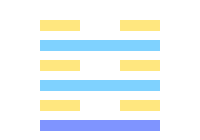
63.1 (63 > 39) - THE KÎ 3Î HEXAGRAM.
The first line, undivided, (shows its subject as a driver) who drags back his wheel, (or as a fox) which has wet his tail. There will be no error.
Bing DeepL Google Yandex63.1 (63 > 39) - Stopping at the brink of the abyss
One seeks the help of one's relatives to be able to back-pedal.
Bing DeepL Google Yandex63.1 (63 > 39) - Stopping at the brink of the abyss
One seeks the help of one's relatives to be able to back-pedal.
Bing DeepL Google Yandex63.1 (63 > 39) - Tchi tzi, ce qui suit l’achèvement
Tchi-tzi : traversée achevée, achèvement, succès, moyen d’achever, compléter.
Traversée achevée comme celle de quelqu’un qui, ayant fini son voyage, reprend les roues de son char, ou d’un renard qui, tout en traversant une rivière, a mouillé sa queue complètement.
Bing DeepL Google Yandex63.1 (63 > 39) - S'arrêter au bord du gouffre
On sollicite l'aide de ses proches pour pouvoir faire machine arrière.
Bing DeepL Google Yandex63.1 (63 > 39) - Maximum
Kéri a közelállókat hogy készüljenek fel mielőtt válaszolnak.
Bing DeepL Google Yandex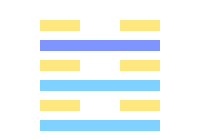
63.5 (63 > 36) - THE KÎ 3Î HEXAGRAM.
The fifth line, undivided, shows its subject (as) the neighbour in the east who slaughters an ox (for his sacrifice) ; but this is not equal to the (small) spring sacrifice of the neighbour in the west, whose sincerity receives the blessing.
Bing DeepL Google Yandex63.5 (63 > 36) - Dealing with the most pressing issues
The simple will do better than the complicated.
Bing DeepL Google Yandex63.5 (63 > 36) - Dealing with the most pressing issues
The simple will do better than the complicated.
Bing DeepL Google Yandex63.5 (63 > 36) - Tchi tzi, ce qui suit l’achèvement
Tchi-tzi : traversée achevée, achèvement, succès, moyen d’achever, compléter.
Tel voisin de gauche (Est) sacrifie un bœuf, mais il n’atteint pas le mérite de son voisin de droite (Ouest), qui fait un sacrifice très inférieur. — C’est la droiture d’intention (et non l’oeuvre matérielle) qui fait obtenir le bonheur, condition de la réussite, d’un achèvement heureux.
Ainsi arrive grand bonheur.
63.5 (63 > 36) - Parer au plus pressé
Le simple réussira mieux que le compliqué.
Bing DeepL Google Yandex63.5 (63 > 36) - Maximum
Az egyszerű sokkal sikeresebb lesz mint a bonyolult.
Bing DeepL Google Yandex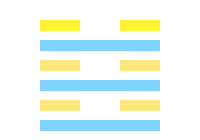
63.6 (63 > 37) - THE KÎ 3Î HEXAGRAM.
The topmost line, divided, shows its subject with (even) his head immersed. The position is perilous.
Bing DeepL Google Yandex63.6 (63 > 37) - Worrying about a return to difficulties
The others avoid helping, so one continues to improve to repair without them.
Bing DeepL Google Yandex63.6 (63 > 37) - Worrying about a return to difficulties
The others avoid helping, so one continues to improve to repair without them.
Bing DeepL Google Yandex63.6 (63 > 37) - Tchi tzi, ce qui suit l’achèvement
Tchi-tzi : traversée achevée, achèvement, succès, moyen d’achever, compléter.
Celui qui, en traversant (un fleuve), se mouille la tête, est en danger. (Si la tête même entre dans l’eau.)
Cette situation est dangereuse, on ne peut en prévoir l’issue.
63.6 (63 > 37) - Craindre un retour des difficultés
Les autres évitent d'apporter leur aide, alors on continue de s'améliorer pour réparer sans eux.
Bing DeepL Google Yandex63.6 (63 > 37) - Maximum
A többiek óvakodnak a segítségnyújtástól, így nélkülük javít tovább.
Bing DeepL Google YandexIn the making: 52
What is poised to happen
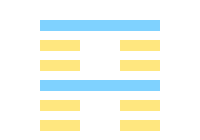
52 - THE KĂN HEXAGRAM.
When one's resting is like that of the back, and he loses all consciousness of self; when he walks in his courtyard, and does not see any (of the persons) in it, there will be no error.
Bing DeepL Google Yandex52 - Stop
One recognizes that it is time to stop because one needs to feed oneself.
Bing DeepL Google Yandex52 - Stop
One recognizes that it is time to stop because one needs to feed oneself.
Bing DeepL Google Yandex52 - Kán, l’arrêt
Kán : ferme, tenir droit, bien réglé, arrêter, reposer
Kan « ferme ». L’homme ferme tourne le dos et s’oppose résolument, sans tenir compte de lui-même. S’il traverse un endroit, il ne regarde pas qui y est et ne faillit point.
Texte
L’homme ferme s’oppose résolument (au mal) sans tenir compte de lui-même. Devant traverser un endroit, il ne regarde pas qui s’y trouve (mais le fait résolument) et ne faillit point.
Symbolisme
Deux montagnes superposées forment le Koua. Ainsi l’homme supérieur pense à ne pas dépasser les bornes de ses fonctions.
Commentaire
Kán signifie s’arrêter, tenir ferme, en bon ordre, agir ou s’arrêter selon l’occasion. Quand l’acte et sa cessation ont lieu en temps convenable, la conduite est belle et intelligente. « Rester à sa place », cela veut dire que les grands et les petits sont en rapport, mais sans usurpation ni entre-croisement. Celui qui est ferme et attentif à son devoir ne se recherche pas lui-même. Marchant dans son jardin, il ne voit pas même qui s’y trouve.
Note. Tout ceci illustre le sens « tenir droit, bien réglé » et se réfère aux rites du maintien extérieur qui prescrivent de se tenir toujours droit et de ne pas même s’asseoir sur un siège qui n’est pas droit.
52 - Cesser
On reconnaît qu'il est temps de s'arrêter car on a besoin de s'alimenter.
Bing DeepL Google Yandex52 - Megállás
Felismeri hogy itt az ideje megállni mert a többieket táplálni kell.
Bing DeepL Google YandexThe nuclear hexagram: 64.6 (64 > 40)
The nuclear hexagram is the association of the two inner trigrams (lines 2,3,4 and 3,4,5). It represents the root, or the origin of the situation.
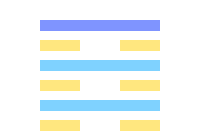
64.6 (64 > 40) - THE WEI 3Î HEXAGRAM.
The topmost line, undivided, shows its subject full of confidence and therefore feasting (quietly). There will be no error. (If he) cherish this confidence, till he (is like the fox who) gets his head immersed, it will fail of what is right.
Bing DeepL Google Yandex64.6 (64 > 40) - Being wary of excessive words
If one shows hesitations, one can discourage one's group.
Bing DeepL Google Yandex64.6 (64 > 40) - Being wary of excessive words
If one shows hesitations, one can discourage one's group.
Bing DeepL Google Yandex64.6 (64 > 40) - Wei tzi, ce qui précède l’achèvement.
Wei-tzi : traversée non achevée, oeuvre non achevée, succès interrompu, compromis ; chose non achevée, non menée à bonne fin.
Celui qui, sans aucun souci, se plonge la tête dans le vin et les spiritueux, perdra la droiture et la bonne fortune. Il méconnaît la modération.
Bing DeepL Google Yandex64.6 (64 > 40) - Se méfier des paroles excessives
Si l'on montre ses hésitations, on pourra décourager son groupe.
Bing DeepL Google Yandex64.6 (64 > 40) - Ingatagság
Nem mutathatja a tétovázást, hogy ne gátolja a csoportját.
Bing DeepL Google YandexRuler
The starting situation

63.6 (63 > 37) - THE KÎ 3Î HEXAGRAM.
The topmost line, divided, shows its subject with (even) his head immersed. The position is perilous.
Bing DeepL Google Yandex63.6 (63 > 37) - Worrying about a return to difficulties
The others avoid helping, so one continues to improve to repair without them.
Bing DeepL Google Yandex63.6 (63 > 37) - Worrying about a return to difficulties
The others avoid helping, so one continues to improve to repair without them.
Bing DeepL Google Yandex63.6 (63 > 37) - Tchi tzi, ce qui suit l’achèvement
Tchi-tzi : traversée achevée, achèvement, succès, moyen d’achever, compléter.
Celui qui, en traversant (un fleuve), se mouille la tête, est en danger. (Si la tête même entre dans l’eau.)
Cette situation est dangereuse, on ne peut en prévoir l’issue.
63.6 (63 > 37) - Craindre un retour des difficultés
Les autres évitent d'apporter leur aide, alors on continue de s'améliorer pour réparer sans eux.
Bing DeepL Google Yandex63.6 (63 > 37) - Maximum
A többiek óvakodnak a segítségnyújtástól, így nélkülük javít tovább.
Bing DeepL Google YandexCorrection
The direction where the ruler is going to bend
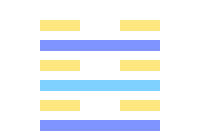
63.1.5 (63 > 15) - THE KÎ 3Î HEXAGRAM.
- 1. The first line, undivided, (shows its subject as a driver) who drags back his wheel, (or as a fox) which has wet his tail. There will be no error.
- 5. The fifth line, undivided, shows its subject (as) the neighbour in the east who slaughters an ox (for his sacrifice) ; but this is not equal to the (small) spring sacrifice of the neighbour in the west, whose sincerity receives the blessing.
63.1.5 (63 > 15) - Maximum
One crosses swords with those who think they can win, regardless of who their opponents are.
Bing DeepL Google Yandex63.1.5 (63 > 15) - Maximum
One crosses swords with those who think they can win, regardless of who their opponents are.
Bing DeepL Google Yandex63.1.5 (63 > 15) - Tchi tzi, ce qui suit l’achèvement
Tchi-tzi : traversée achevée, achèvement, succès, moyen d’achever, compléter.
- 1. Traversée achevée comme celle de quelqu’un qui, ayant fini son voyage, reprend les roues de son char, ou d’un renard qui, tout en traversant une rivière, a mouillé sa queue complètement.
-
5. Tel voisin de gauche (Est) sacrifie un bœuf, mais il n’atteint pas le mérite de son voisin de droite (Ouest), qui fait un sacrifice très inférieur. — C’est la droiture d’intention (et non l’oeuvre matérielle) qui fait obtenir le bonheur, condition de la réussite, d’un achèvement heureux.
Ainsi arrive grand bonheur.
63.1.5 (63 > 15) - Le maximum
On croise le fer avec ceux qui pensent avoir raison quels que soient leurs opposants.
Bing DeepL Google Yandex63.1.5 (63 > 15) - Maximum
- 1. Kéri a közelállókat hogy készüljenek fel mielőtt válaszolnak.
- 5. Az egyszerű sokkal sikeresebb lesz mint a bonyolult.

